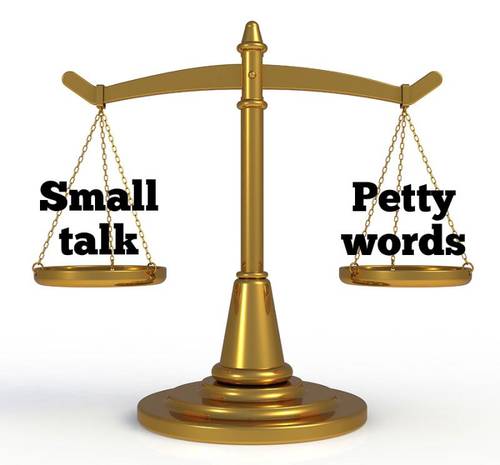Torah On the Grow, a periodic blog by Rav Shai Cherry
01/31/2020 12:00:46 PM
Not everyone has the luxury, or patience, to learn Torah every week. Torah on the Grow is for that audience. The goal is to bring a Jewish perspective to topics that surround us in our non-Jewish environment. The hope is to grow in our Jewish knowledge, in our appreciation of Jewish wisdom, and in our desire to learn more. – Rav Shai Cherry
To receive the periodic posts in your mailbox, click here to subscribe.
From Small Talk to Petty Words
10/03/2019 01:34:02 PM
 The most recent Jewish legal commentary to gain wide acceptance in the observant world was composed by Israel Meir Ha-Cohen (1839-1933) of Lithuania. It is a commentary on one part of Josef Caro’s legal code, the Shulchan Arukh (1488-1575). But the name that crowns Rabbi Israel Meir is not that of his commentary on a code, the Mishnah Brurah, but that of his pioneering work on the laws of libel and gossip (lashon hara), the Hafetz Hayim.
The most recent Jewish legal commentary to gain wide acceptance in the observant world was composed by Israel Meir Ha-Cohen (1839-1933) of Lithuania. It is a commentary on one part of Josef Caro’s legal code, the Shulchan Arukh (1488-1575). But the name that crowns Rabbi Israel Meir is not that of his commentary on a code, the Mishnah Brurah, but that of his pioneering work on the laws of libel and gossip (lashon hara), the Hafetz Hayim.
It is amazing that lashon hara was not part of Jewish law/halakhah until the Hafetz Hayim was written in 1873. The subjects do not appear in Caro’s comprehensive code. Rabbi Israel Meir transformed the ethical aspirations of our non-legal literature into black letter law. More amazingly, it was accepted. Until the Hafetz Hayim, it was common sense and common courtesy not to spread nasty rumors; after the Hafetz Hayim, it became halakhah.
The Hafetz Hayim prohibited neutral communications about third parties, as well. Perhaps he was concerned that we would fill our time with trivial gossip. He even forbade sharing positive news about others. A complimentary comment might lure the listener into saying something derogatory to balance out the praise. Even if not explicit, an insinuation could cloud the compliment and sow seeds of suspicion.
The Hafetz Hayim prefers we engage in constructive communication on subjects of significance, ideally Torah. Small talk is often necessary to introduce matters of substance; but small talk can easily slide into petty words. As we approach Yom Kippur, the day when we hope to be sealed in the Book of Life, let’s remember that our deeds and words, whether spoken or posted, are weighed on the divine scales.
Who is the person who desires life/hafetz hayim?
Guard your tongue from evil/lashon hara,
and your lips from speaking misleadingly;
Turn from evil and do good, seek peace and pursue it.
— Psalm 34:13-15
The Need for Impeachment
09/26/2019 01:43:12 PM
Judaism knows nothing of impeachment from office. For Jews, power does not reside in an office (be it the president or a priest); for Jews, power resides with the person. When a previously influential person is perceived as no longer worthy of their influence, their power naturally diminishes.
Judaism does not impeach, but it does excommunicate or shun. Elisha ben Abuya was the most famous Talmudic sage to be excommunicated. His transgression was heresy, and the sages’ concern was that he would influence others to follow him beyond the Jewish path. He had to be excommunicated, from the Rabbis’ point of view, precisely because they could not deprive him of his powers of persuasion. His punishment was not to lose his office, as in impeachment, but to be shunned by his community to ensure a safe distance between Elisha’s heretical ideas and open minds malleable to his logic.
 The rabbis fantasized about how to prevent kings, who could not be excommunicated, from becoming corrupt. They imagined the king’s throne situated between two high-backed chairs of gold, one for the High Priest and the other for the Deputy High Priest. Every time the king would climb each of the six steps to his throne, a herald would proclaim a regal restriction from the Torah to remind the king of the King of kings. In the middle of his ascent, the herald would proclaim, “Do not bend the law” (Dt. 16:19). The next warning, from the same verse, is “do not recognize a face.” Should the king approach the limit lines of those restrictions, the priestly guardians of Torah are there to keep him on the path of justice. A society whose leaders “recognize faces,” who bend the law based on the identity of the parties, is a leadership susceptible to corruption. Such societies require the remedy of impeachment.
The rabbis fantasized about how to prevent kings, who could not be excommunicated, from becoming corrupt. They imagined the king’s throne situated between two high-backed chairs of gold, one for the High Priest and the other for the Deputy High Priest. Every time the king would climb each of the six steps to his throne, a herald would proclaim a regal restriction from the Torah to remind the king of the King of kings. In the middle of his ascent, the herald would proclaim, “Do not bend the law” (Dt. 16:19). The next warning, from the same verse, is “do not recognize a face.” Should the king approach the limit lines of those restrictions, the priestly guardians of Torah are there to keep him on the path of justice. A society whose leaders “recognize faces,” who bend the law based on the identity of the parties, is a leadership susceptible to corruption. Such societies require the remedy of impeachment.
"A New King Arose Over Egypt Who Did Not Know Joseph" - Exodus 1:8
09/19/2019 01:48:54 PM
Could a king could be so ignorant as to not know his country’s own recent history?
One of our medieval commentators, Abraham ibn Ezra (1089–1167), anticipated an historically informed answer based on the word “arose.” According to him, “arose” implies that the new king was not related to the old king. There was regime change, and the new king doesn’t “recognize” Joseph’s legitimacy. Joseph had become identified with the ancien regime which the new pharaoh knew all too well. Hence, this new pharaoh enslaved Joseph’s family.
Alternatively, Rebbe Shmuel Taub (1905–1984) points out that had the new pharaoh known Joseph, he would not have mistreated him or his clan. After all, Joseph was one blessed Hebrew. Look at what happened to that Pharaoh as a result of his not knowing: Egypt’s food supply was ruined, the Egyptians were stripped of their gold and silver, their first born were killed, Pharaoh’s finest chariots and charioteers were drowned, and Pharaoh’s work force was decimated. Not only did the Hebrews break free, but the mixed multitude busted out, too.
In our country, a new leader has arisen. In Israel, after two elections a new leader is likely to arise. In 2020, we will vote on the longevity of our new leader. Both of our homelands are bitterly divided. It’s important to know our history; but it’s more important to rehearse our values. The King of Israel had to read from Torah “every day of his life” (Deuteronomy 17:19). Since we elect our leaders, it is our responsibility to learn Torah every day of our lives. To avoid pharaoh’s fate, we must know Joseph, know the bitter family divisions that landed him in Egypt, and know the Torah’s teachings and values that emerged in the
aftermath of our redemption.
Apologies Without Borders
09/12/2019 01:54:06 PM
When we err, an all too predictable defense mechanism is to cut ourselves slack and rationalize our misbehavior. Jean Paul Sartre suggested that our capacity for rationalization is infinite. Given that the best defense is offense, our capacity for self-righteous indignation might be infinite, too. No wonder it’s so tough to admit we’re wrong and apologize!
Jesus and Rabbi Akiva made famous the Torah’s verse about loving your neighbor as yourself. The verse, however, is as opaque as it is popular. What does it mean to love your neighbor as yourself? (Similarly, what does it mean to love the stranger or to love God? For that matter, how do I love myself?) One way to understand this command is to cut your neighbor as much slack as you cut for yourself. Cut slack unto others as you would have others cut slack unto you.
 The problem arises on the other side of the rope. You’re the one who needs slack from the person you’ve offended, but you’re only feeling their tug of resistance. Your instinct is to meet their tug with equal and opposite force. That’s when the rope frays.
The problem arises on the other side of the rope. You’re the one who needs slack from the person you’ve offended, but you’re only feeling their tug of resistance. Your instinct is to meet their tug with equal and opposite force. That’s when the rope frays.
An apology’s function is to appease the one who has been offended. The Mishnah makes no concessions if your victim happens to be extra difficult to appease. Your self-righteous indignation won’t apologize; it can’t. Only your humble and flawed self can apologize without invoking mitigating circumstances. Any sort of apology might appease; only an unalloyed apology can heal.
Being a Blessing
09/05/2019 01:58:27 PM
 My sister once noticed that an elderly man’s shoelaces were untied. So she tied them. He then put his hands on her head and blessed her. Who gets blessings from strangers? Even weirder, who gives blessings to strangers?
My sister once noticed that an elderly man’s shoelaces were untied. So she tied them. He then put his hands on her head and blessed her. Who gets blessings from strangers? Even weirder, who gives blessings to strangers?
Edward L. Greenstein, a scholar of the Hebrew Bible, described the Torah’s world as a “modest utopia where people bless each other for being kind.” It’s very nice to be thanked or even praised, but it doesn’t compare to being blessed. It’s a rare occurrence, but when it happens it fans an inner ember.
After God tells our patriarch, Abram, to leave his home, his next commandment is to be a blessing (Genesis 12:3). Most commentators understand that Abram should behave in a way worthy of being blessed. Ibn Gikitilla, a medieval mystic, offers a different interpretation based on a Rabbinic midrash: “Blessing has been given to you. Take it as you will, and know that it is not for you alone, but you may give it to anyone that you wish.” Like a single flame kindling other lights, we can bestow blessings without diminishing our own.
I don’t remember if my sister ever blessed me before she was blessed, but she has since. Many times. It was a bit strange to be blessed, and even stranger the first time I gave a blessing. But the discomfort quickly gave way to something like an endorphin rush. Try it—the blessing has been given to us, and we can give it to anyone we wish. (I do recommend, however, asking permission before putting your hands on anybody’s head.) Our modest utopia awaits.
Comfort vs. Safety
08/29/2019 02:00:43 PM
 I once gave a guest sermon in which I mentioned something critical about the behavior of an Israeli soldier. The regular rabbi of the group explained to me that people come to shul to be in a safe space and that my criticism made some folks uncomfortable.
I once gave a guest sermon in which I mentioned something critical about the behavior of an Israeli soldier. The regular rabbi of the group explained to me that people come to shul to be in a safe space and that my criticism made some folks uncomfortable.
Comfort is overrated in American culture. It’s not a Jewish value. We imagine that God accepts us where we are, but only if we strive not to stay there. Jewish culture is not one of complacency.
In the heart of the daily prayer service, we ask for a series of blessings. The very first request is for knowledge, understanding, and intelligence. It’s not a request for a higher IQ or better SAT scores. The meaning of the request isn’t obvious until you get to the next request which is about teshuva/turning toward the divine will. The prior request, our first request, is to understand where we have strayed from God’s will so that we can reorient ourselves. Our very first request, then, is to become uncomfortable with where we are.
Synagogues should be safe spaces where Jews can engage in the battle of ideas in the communal effort to clarify how best to pursue God’s will. That battle necessitates that positions be challenged and, as a result, minds might be changed. The process may not be comfortable, but it is the price of admission for Jewish culture. Comfort and safety overlap but are not the same thing. Confusing the two risks losing the sanctity of a safe battle ground.
Blessing the Essential
08/22/2019 02:04:13 PM
 My Mom made a mean egg salad. Usually, I would just stand by the kitchen sink with the bowl and a fork. When I had more patience, I would break out the bread and slice a tomato. Alternatively, I would smear it on rice cakes for a great crunch. Here’s the question: is the blessing the same for each meal, or does the blessing depend on the delivery vehicle for the egg salad?
My Mom made a mean egg salad. Usually, I would just stand by the kitchen sink with the bowl and a fork. When I had more patience, I would break out the bread and slice a tomato. Alternatively, I would smear it on rice cakes for a great crunch. Here’s the question: is the blessing the same for each meal, or does the blessing depend on the delivery vehicle for the egg salad?
According to the Mishnah, one blesses on what is essential and exempts what is incidental. Applying that rule to my mother’s egg salad, I would not say “hamotzi lechem min ha’aretz” even on fresh rye. I’d always say she’ha’col, recognizing the egg salad as essential rather than the mode of delivery. Here’s the beauty: When my Mom would serve egg salad sandwiches to me and my sister, we’d each recite different blessings over the same food. We consider different things essential. (Don’t you love being Jewish?)
The great Kabbalist Isaac Luria seems to disagree with God’s assessment of the world. God pronounced everything as very good; Luria thought it was mixed. Maybe what is mixed is very good because it gives us an opportunity to make things better. Could the world be very good if we couldn’t contribute to it by making it better? (Rav Kook would say absolutely not!)
Let’s say our lives, like Luria’s world, are mixed — what do we bless? What’s essential? And what’s incidental? It’s a Rorschach test. Not only will different people make different blessings, but the same person will make different blessings at different times. It has been four years since I’ve been able to savor my Mom’s egg salad. Now I say hamotzi. What’s essential that you’re blessing?
Back to Shul
08/16/2019 02:07:19 PM
 What would be sold at a Back to Shul sale? Different prayer books? Customized head coverings? Air Pods? (Air Pods are wireless headphones so discrete as to be obscured by a full head of hair, but not so discrete as to escape the attention of most college professors and rabbis.)
What would be sold at a Back to Shul sale? Different prayer books? Customized head coverings? Air Pods? (Air Pods are wireless headphones so discrete as to be obscured by a full head of hair, but not so discrete as to escape the attention of most college professors and rabbis.)
Part of the excitement of coming back to school is seeing old friends but having new teachers and new classes. Maybe there will even be new faces among the student body. At shul, we see old friends and the occasional new face. But there’s more consistency with our teachers and classes than at school. That’s mostly a good thing. At school, the goal is learning; at shul, the goal is serving God.
Doesn’t it feel a tad pretentious to think that we can serve God? But Judaism, unlike some other religions, accords astonishing power to human actions. Services in shul are designed to prepare us for serving God outside of shul. Part of the preparation is shavat vayinafash/rejuvenation; and part of the preparation is learning, and reviewing, how we are to serve God outside of shul. Rejuvenation tracks on to those things we are bidden not to do on Shabbat and the holidays. Learning tracks on to the ritual and the content of the prayers. The trick is to prevent the learning from becoming what Rashi calls “stale dictates.”
From the Torah to today, our covenant with God has had one principal goal: to live long on the land that the Lord, our God, has given us. As the psalmist suggests (six times), singing a new song keeps things fresh. The occasional new song might even encourage some folks to leave their Air Pods at home.
Redeeming Sins
08/09/2019 02:11:28 PM
Elisha ben Abuyah says: He who learns when a child, to what is he compared?
To ink written upon a fresh writing sheet. And he who learns when an old man,
to what is he compared? To ink written on a rubbed-out writing sheet/palimpsest.
Mishnah, Avot/Fathers/Founders 4:20
 God willing, every child grows older, and in the process learns new things. Is Elisha ben Abuyah making the rather obvious observation that adult learners are never blank slates? Unlikely. His point is that when a child learns without the benefit of Jewish values, even when she studies Torah as an adult, she’ll be less than pristine. “What can you expect? Look at her parents.” Or, “It’s no wonder given her past!”
God willing, every child grows older, and in the process learns new things. Is Elisha ben Abuyah making the rather obvious observation that adult learners are never blank slates? Unlikely. His point is that when a child learns without the benefit of Jewish values, even when she studies Torah as an adult, she’ll be less than pristine. “What can you expect? Look at her parents.” Or, “It’s no wonder given her past!”
Elisha ben Abuyah was a heretic. Like Voldemort, we shy away from even saying his name. The halakhah prohibits taunting anyone about their parents or past. Indeed, according to one Talmudic sage, where a ba’al teshuvah stands, not even a perfectly righteous person can. (A ba’al teshuvah is one who has reoriented her life towards Jewish values and practices.) The same sage encourages us to combine Torah study with worldly wisdom in order to maximize the Torah’s potential.
The patron saint of ba’alei teshuva (the plural of ba’al teshuvah) is Reish Lakish. Some say he was a highway man, others that he was a gladiator. All acknowledge that had he not been a palimpsest, Judaism would be the poorer. Never let a good sin
go to waste. Redeem it. Reish Lakish taught, “Teshuvah transforms intentional sins into merits.” How else will redemption dawn?
Hold the Ice Cream
08/01/2019 02:15:24 PM
![]() New moons were mini celebrations in ancient Israel. A few men would kill a goat (Numbers 28:15), and everyone else would feast. In our family, ice cream is the preferred method for celebrating the new moon.
New moons were mini celebrations in ancient Israel. A few men would kill a goat (Numbers 28:15), and everyone else would feast. In our family, ice cream is the preferred method for celebrating the new moon.
But is the new moon of Av, which begins at sunset on August 1, a time to celebrate? The Talmud tells us from the moment Av enters, we are to diminish our joy in recognition that the ninth of Av, tisha b’Av, commemorates the destruction of the Jerusalem Temple. To diminish our joy, however, is not to be joyless. If normally we would feast on the new moon, let us make do with one fewer dish. Although our children are still entitled to a Rosh Hodesh (new moon) treat, they don’t get ice cream on Rosh Hodesh Av. Until tisha b’Av, we turn down the volume, but we can still listen to our favorite music. Only on tisha b’Av is the music silenced.
When my mother died, I recited a blessing. When I received the inheritance, I recited a different blessing. Abraham Joshua Heschel wrote: “Judaism is a religion of time aiming at the sanctification of time.” Since no two moments are identical, no two attempts to sanctify the moment should be. As Kohelet/Ecclesiastes, Pete Seeger, and the Byrds all understood, emotional multitasking is counterproductive. There is a time for feasting, and a time for fasting. There is a time for ice cream, and a time for refraining from ice cream.



